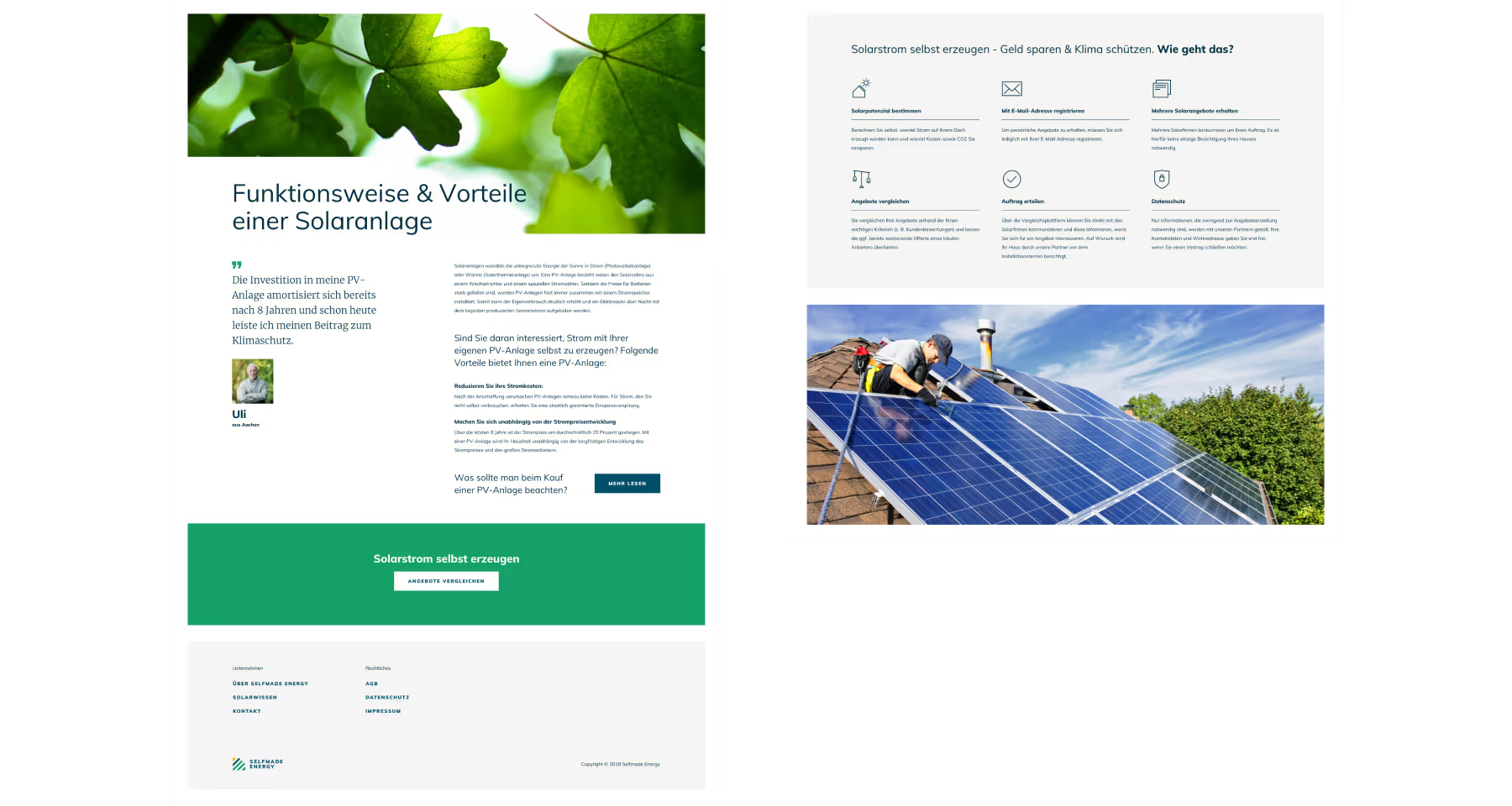


After providing basic information about their household, e.g. ZIP code or roof size, the user receives offers from three photovoltaics (PV) system installers and chooses the vendor that suits their needs best.


Dr. Tim Rosengart, the founder of a Berlin-based startup, was looking for a tech partner who would help him disrupt the local renewable energy market. As Germany is leaving the fossil-nuclear age behind, paving the way for photovoltaics (PV) will play a central role in a future shaped by sustainable power production. In order to cover all energy needs from renewable energies, a massive expansion of the installed PV power is necessary. Dr. Tim Rosengart wished to show the German citizens that the installation of the solar panels – although often perceived as expensive – can lead to significant savings in the long run.
Being a proactive member of the Berlin startup ecosystem, Merixstudio approached Dr. Rosengart offering to bring his idea to life with tech expertise, ownership, and outstanding design skills.



Our collaboration began with an intense product discovery workshop. As a means of achieving his goal, the client dreamed up a web app that would simplify the process of finding the solar energy provider whose quality-price ratio is the highest. Selfmade Energy’s founder arrived equipped with extensive demographic data as well as a thorough understanding of the legal matters and the German renewable energy market. This, matched with the inquisitiveness and the experience of the project team, significantly sped up the discovery process.
Within two days, we chose a relevant tech stack, defined system architecture, and proposed the best design solutions. Another outcome worth mentioning is a very precise estimation which, bearing in mind that the Selfmade Energy was a budget-sensitive project, was the core of successful collaboration with the client. As Dr. Rosengard was open to the agile approach, we exceeded the budget slightly in the end. This, however, was the result of enriching the web app with new functionality for the benefit of the users.
Owing to the socio-economic conditions in Germany, the target audience of Selfmade Energy's product includes middle-aged owners of detached houses. Bearing that – as well as the fact that the choice of a PV installer is rarely made on the go – in mind, we decided on a desktop-first solution. For the backend of the web app, we chose Python/Django, to facilitate the integration of the product with the third-party API. The adopted solutions lowered the cost of development and shortened the time of building an MVP to less than 4 months – which made them perfect for the core version of the product.
As Selfmade Energy aims at popularizing green energy, Dr. Rosengard wanted the product’s logo to convey the eco-friendly message as well. That’s how we came up with a simple yet meaningful logo: yellow, blue, and green shapes standing for the Sun, the PV module, and a house powered by green energy respectively. We incorporated the same hues in the app’s design. We paid special attention to making it clean which paid off when the end-users described the website as both appealing and usable.
During the development process, we worked in 2-week-long sprints following the best SCRUM practices. Not only did we hold daily meetings for the project team, but we also involved the Client in the bi-weekly review meetings and the ad-hoc refinement sessions. Knowing the value of regular communication, our team of three developers, two designers, a QA specialist, and a project manager stayed in touch with the Client using Slack and Google Hangouts.
At the moment, the Selfmade Energy comparison system is being improved according to the user feedback and is about to enter the German renewable energy market. It’s worth mentioning that rather than charging the end-users, its founder chose to implement a referral fee business model – a decision that is bound to support his quest for the popularization of solar energy.



During the development process, we worked in 2-week-long sprints following the best SCRUM practices. Not only did we hold daily meetings for the project team, but we also involved the Client in the bi-weekly review meetings and the ad-hoc refinement sessions. Knowing the value of regular communication, our team of three developers, two designers, a QA specialist, and a project manager stayed in touch with the Client using Slack and Google Hangouts.
At the moment, the Selfmade Energy comparison system is being improved according to the user feedback and is about to enter the German renewable energy market. It’s worth mentioning that rather than charging the end-users, its founder chose to implement a referral fee business model – a decision that is bound to support his quest for the popularization of solar energy.


Based on the data provided by the user, the tool determines their house’s solar rooftop potential.
Provides two types of users, the customer and the vendor, with relevant information, e.g. about PV module inquiries or vendors’ offers, as well as a communication tool.
A messaging app facilitating communication between customers and vendors.
Taking into consideration customers’ requirements, the system picks best-fitting offers and compares them, e.g. in terms of price.
Tool allowing administrators to generate reports and fetch various statistics.